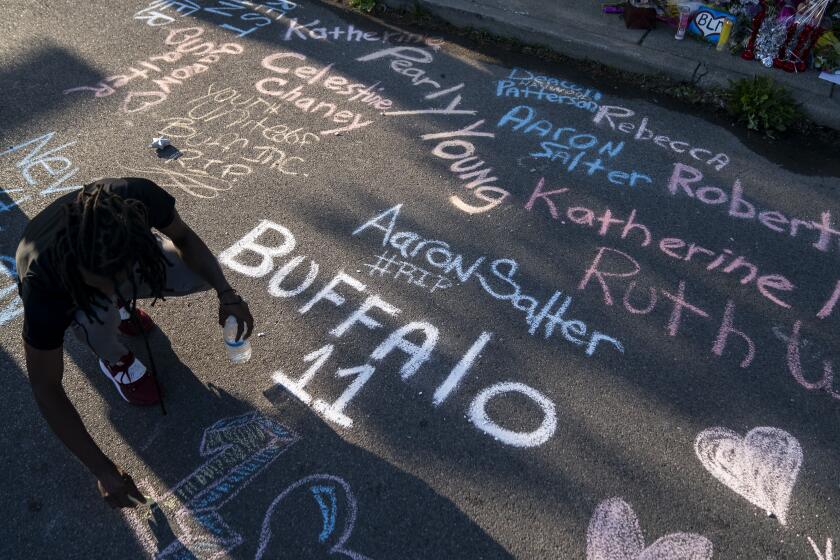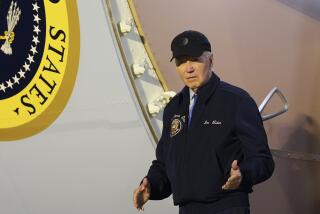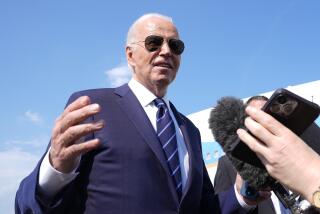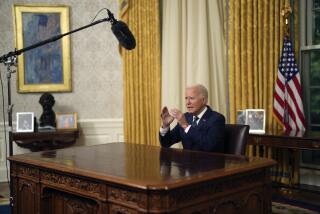Biden condemns Buffalo mass shooting as ‘terrorism’ and white supremacy as ‘a poison’

President Biden went to Buffalo to meet the families of victims killed in what police described as a racially motivated shooting. Ten people died in the carnage.
- Share via
BUFFALO, N.Y. — President Biden on Tuesday condemned Saturday’s deadly mass shooting in Buffalo as a “racist rampage” and an act of “domestic terrorism,” calling on Americans to reject the racist theory that authorities say appeared to have motivated the gunman to carry out the massacre.
“White supremacy is a poison running through our body politic. And it’s been allowed to fester and grow right in front of our eyes,” Biden told grieving families during an impassioned speech at a community center.
“In America,” he added, “evil will not win, I promise you. Hate will not prevail. And white supremacy will not have the last word.”
Officials say the suspected killer, Payton Gendron, wrote a 180-page document that included references to the racist and antisemitic “great replacement” conspiracy theory, which posits that a cabal of elites are engineering the replacement of whites with nonwhite immigrants.
Gendron, 18, who lived 200 miles away in Conklin, N.Y., has been arrested and charged in the massacre.
“I call on all Americans to reject the lie, and I condemn those who spread the lie for power, political gain and for profit,” Biden said.
The president later told reporters that those who spread such racist concepts were not to blame “for this particular crime, but it serves no purpose, no purpose, except for profit and/or political benefit.”
Before the speech, the president and First Lady Jill Biden paid their respects at a makeshift memorial across the street from the Tops Friendly Markets grocery store and met with families of the victims as well as first responders.
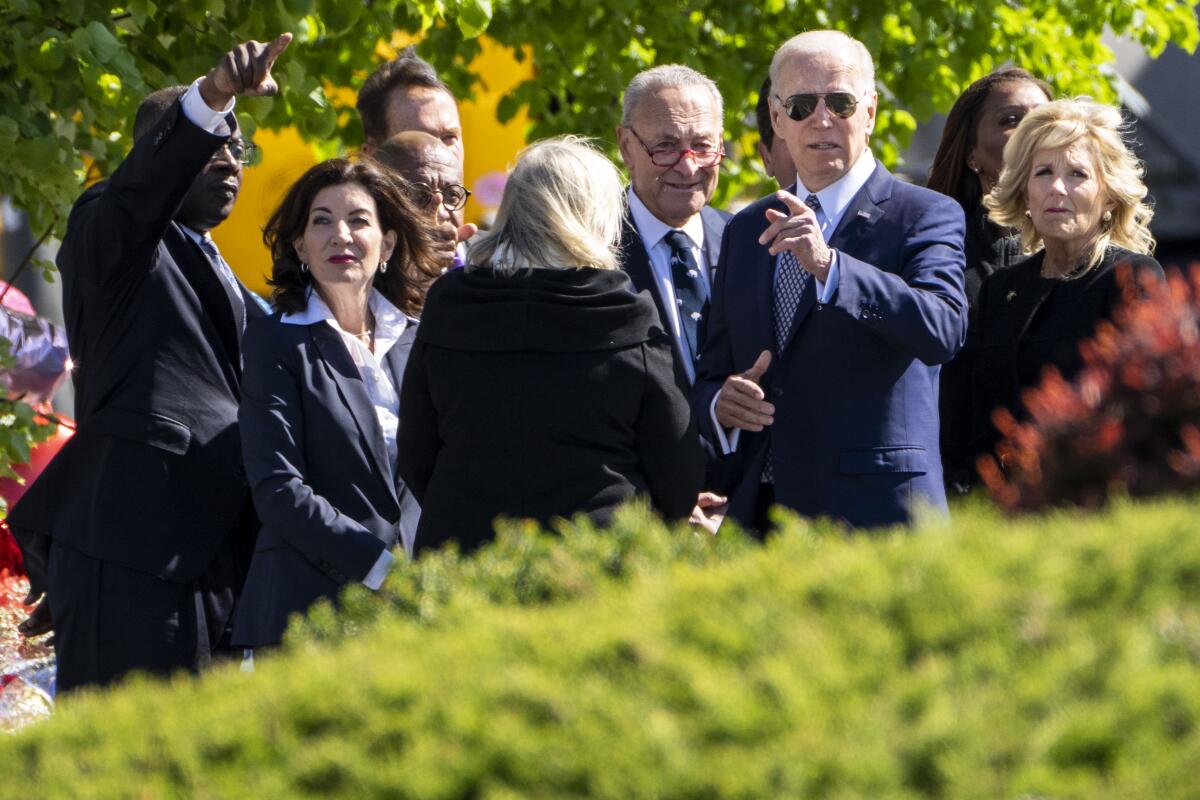
The first lady placed a bouquet of white flowers at the memorial, which was covered with flowers, signs and candles to honor the victims. New York Gov. Kathy Hochul and Senate Majority Leader Charles E. Schumer (D-N.Y.) joined Biden and other local officials at the site.
Wayne Jones Jr., the grandson of Celestine Chaney, one of the victims, said the president took questions during the private meeting.
“He gave a heartfelt speech in there,” said Jones, 27. “It was genuine. It wasn’t fake.”
The family, he said, appreciated that Biden and the first lady “really cared and came to Buffalo to show that they care.”
The White House says President Biden will “grieve with the community that lost 10 lives.” But the community wants more from the president.
Biden has repeatedly said that what drove him to run against former President Trump came after a deadly white nationalist rally in Charlottesville, Va., in 2017. Biden was the first president to directly address white supremacy in an inaugural speech.
In his Buffalo remarks, Biden briefly reflected on his decision to run for president, urging Americans to reject white supremacy and refuse to allow it to “destroy the soul of the nation,” a reference to the campaign slogan that launched his presidential bid.
He called on Americans “of all races, from every background, to speak up as a majority” to reject white supremacy and the “views of a hateful minority.”
The Justice Department is investigating the shooting as a hate crime and an act of racially motivated violent extremism.
In interviews, community members said they hoped Biden would speak about the level of hatred required to carry out a shooting targeting Black people.
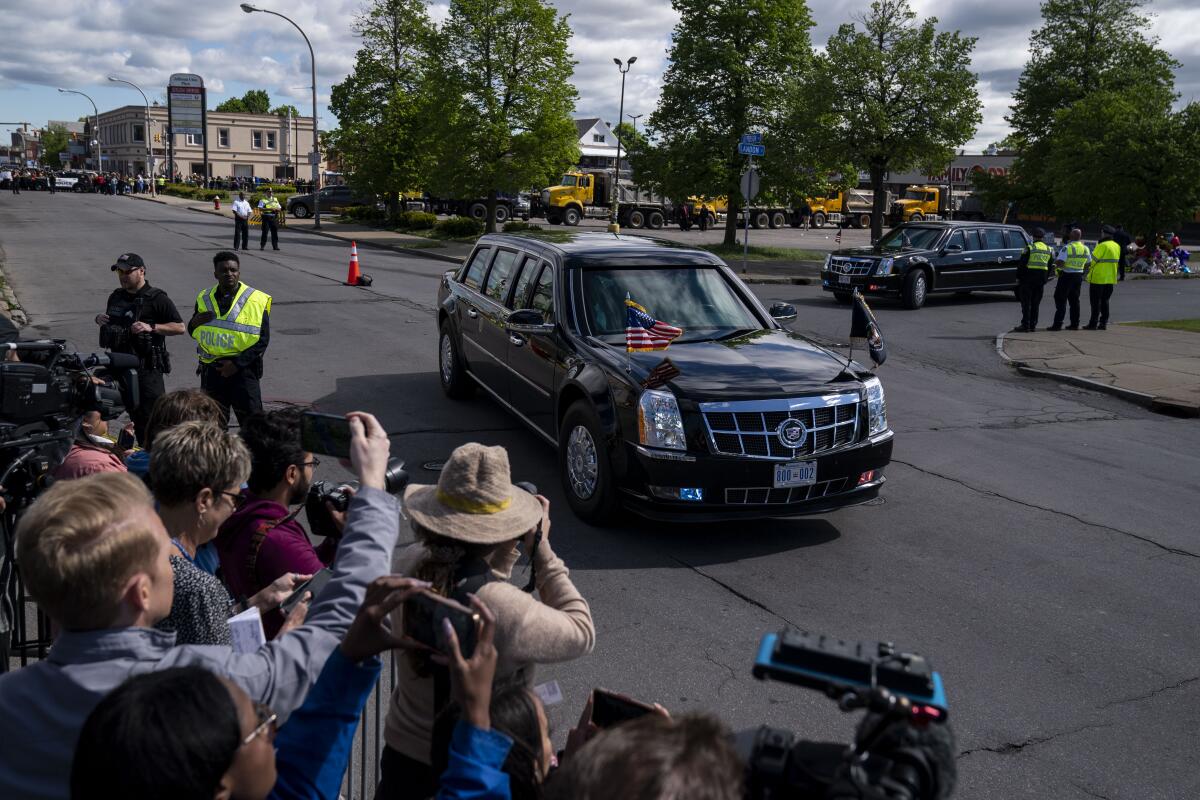
The president devoted the majority of his speech to that request but conceded that similar tragedies are sure to happen again. He urged federal action to ban assault weapons and combat the rise of domestic extremism, though Republicans in Congress have long blocked gun restrictions supported by his administration.
Kris Brown, president of the Brady Campaign to Prevent Gun Violence, said Biden struck the right note in forcefully condemning white supremacy and domestic extremism, but said she would have liked to see similar explicit calls for the Senate to pass gun violence prevention reform.
“I think that was a missed opportunity for him,” she said.
Brown said Biden could have used the speech to endorse eliminating the filibuster, or the 60-vote threshold required for the Senate passage of most bills, if necessary, in order to pass gun reform. She pointed to gun reform bills that were blocked by a filibuster following the 2012 Sandy Hook Elementary School massacre in Newtown, Conn., when Biden was vice president.
“I wish he had noted that because a lot of people have died between now and then,” she said. “Joe Biden has to call on Congress to fix that. And if they have a vote, and it fails, he needs to call on Congress to end the filibuster.”
Biden has endorsed changing the Senate filibuster rules to pass voting rights legislation, but has not extended that support to gun safety bills stalled in Congress.
Chiwuike Owunwanne, a community member who didn’t meet with the president but was among the dozens of attendees present for his speech, said he was grateful for Biden’s visit but underwhelmed by his remarks.
“To be honest, we’ve heard it before — many, many times before,” he said of the speech. “At this point, you can basically copy-paste [the speech] because this has occurred in our communities throughout the country many times, dozens of times. I don’t know whether a different speech can be given, but it feels like a different action is needed because whatever is being done clearly is not working.”
Asked about whether the Buffalo shooting could revive a push for gun safety legislation, Biden told reporters that it would be “very difficult” to pass such measures. He added that he was “not going to give up trying.”
More to Read
Get the L.A. Times Politics newsletter
Deeply reported insights into legislation, politics and policy from Sacramento, Washington and beyond. In your inbox twice per week.
You may occasionally receive promotional content from the Los Angeles Times.
